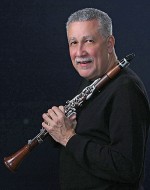Title
In its 12-year history, Juilliard Jazz has hosted no shortage of exemplary figures from the professional music world, but it’s hard to imagine an individual who better fits the program’s vision than Cuban-born multi-reed instrumentalist-composer Paquito D’Rivera, who performs with student ensembles at Paul Hall on April 2. Moving between the idioms of jazz, classical, and Latin-American music poses no difficulty for him, and at the age of 64, he has nearly 60 years of credentials to show for it. D’Rivera’s skills on clarinet, flute, and alto saxophone have earned him slots in ensembles led by late trumpet icon Dizzy Gillespie, but he’s also a respected composer of classical-leaning extended works like his Panamericana Suite, recorded live in 2010. Not many musicians who’ve received the high honor of Jazz Master from the National Endowment of the Arts, which D’Rivera did in 2005, have also won a Grammy for a piece composed for (and recorded by) Yo-Yo Ma (Pre-College ’71, Professional Studies ’72, cello).
Body
“I’ve always tried to mix it up,” D’Rivera recently told The Journal of his all-encompassing approach to music. “It’s just who I am. I’ve always felt there was sort of this hole in music education between jazz and classical music. It’s getting better, but in many ways, they still ignore each other. Jazz players are wonderfully creative but could benefit, I think, from the centuries of tradition and discipline classical music offers, while classical musicians often miss the freshness and spontaneity.”
D’Rivera witnessed this schism firsthand as a child prodigy. His father, Tito D’Rivera, was also a saxophonist, but his repertoire was strictly concert hall. “My father was responsible for importing the classical saxophone repertoire of the French school to Havana in about 1943, several years before I was born,” D’Rivera explained. “I’m talking about composers like Jacques Ibert. Like many classical musicians, my father did not have the ability to improvise, but he was very encouraging of my interests. He had many friends in music beyond the conservatory, so I was introduced to different kinds of music in all kinds of different ways, and had great teacher and tutors. I played with the Orquesta Sinfónica Nacional de Cuba [the island’s national symphony], made jam sessions, whatever was necessary.”
D’Rivera’s gift for making musical polarities cohere was apparent from the moment many international jazz fans first encountered him back in the mid-’70s, when he was one of the focal points of the legendary Havana-based jazz-rock band Irakere (pronounced EE-rah-KEH-ray). Two of the ensemble’s live showstoppers, Missa Negra (The Black Mass) and Adagio on a Mozart Theme, smoothly demonstrated the group’s encyclopedic knowledge of various musical forms. D’Rivera opens the latter arrangement (his own) on flute, but quickly switches to soprano sax in order to mix blues inflection with an astonishing note-for-note rendition of a Mozart piece.
D’Rivera, who’ll give a master class for the students before his April 2 performance, is similarly freewheeling when he’s working with students. “I just improvise,” he said, half chuckling, “because I’m interested in the needs of the group, what instruments they play, etc.—though, of course, I like seeing lots of clarinetists and saxophonists.” As someone who hasn’t returned to his country since he defected while on an Irakere tour of Spain in 1980, D’Rivera doesn’t exclude talking about politics from the sessions. (He became a U.S. citizen in 1987.) The saxist-composer will probably stick to the jazz and Latin sides of his background, but given his extraordinary career, that could mean everything from jazz and popular standards to the kind of Cubana bop he played with Dizzy Gillespie or reinvigorated melodies by Cuban composer Ernesto Lecuona or Brazilian tunesmith Antonio Carlos Jobim, one of his favorites.
When asked his thoughts on the viability of jazz education in a conservatory, D’Rivera made an interesting observation. “Well, if you think about it, essentially it’s not all that different, or maybe it’s just that one thing has changed,” he began. “It used to be that a formal education was all classical and you learned jazz and other types of music in the nightclubs. Jazz may be offered in the classroom now, but I still think it’s similar to the way a conservatory education prepares you to play in an orchestra. After your studies you still have to go out and develop as a player. School may be over, but learning isn’t finished. The major difference with jazz is that once class is over, instead of a concert hall you go to a nightclub.”





